American Drama美国戏剧课件
英语演讲PPT 美剧

《生活大爆炸》是这部电视剧主要描述了加州理工 Leonard(实 验物理学家)和Sheldon(理论物理学家)与他们的邻 居——一个想成为演员却在餐馆打工的漂亮女孩 Penny之间发生的故事。该片的喜剧效果是在两个 主角的书呆子气和高智商与Penny的社会交往能力 和常识之间的对比中达到的。
Theoretical physicist 1 Master’s degree and 2 Doctor’s degrees IQ is 187 Goosy神经质 Obsession强迫症 Cleanliness洁癖 Poisonous tongue毒舌 Perfectionist完美主义者 Fail to understand sarcasm(讥讽) Afraid of his mother Childish
●(CBS
) The Columbia broadcasting company
One of the big three U.S. radio and television company, main is some crime drama, including "CSI" "" crime psychology wait.― CBS , 案剧包括《CSI》《犯罪心理》等.
their
friendship
may lead . to a quite successful business…if they will be able to earn a start-up capital of $250 thousand.
.
She's a poor working class girl who has had a rough childhood and current adult life, riven by genuine poverty and a childhood raised by a mother who was usually absent and was dangerously incompetent when she was around
美国戏剧
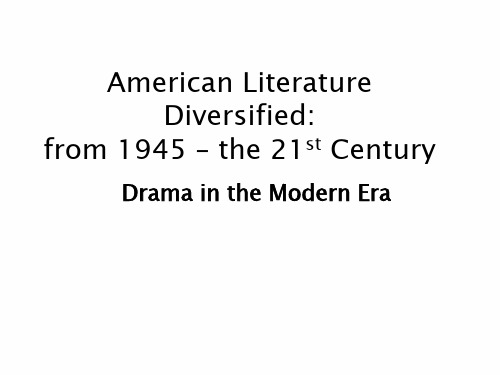
II. Eugene O’Neill (1888-1953)
Introduction Literary Career Characteristics Comment
A. Introduction
Eugene (Gladstone) O'Neill was born in a Broadway hotel room in New York City on October 16, 1888. O'Neill won the Nobel Prize for literature in 1936, and Pulitzer Prizes for four of his plays: Beyond the Horizon (1920); Anna Christie (1922); Strange Interlude (1928); and Long Day's Journey Into Night (1957). O'Neill is credited with raising American dramatic theater from its narrow origins to an art form respected around the world. He is regarded as America's premier playwright.
4.美国戏剧
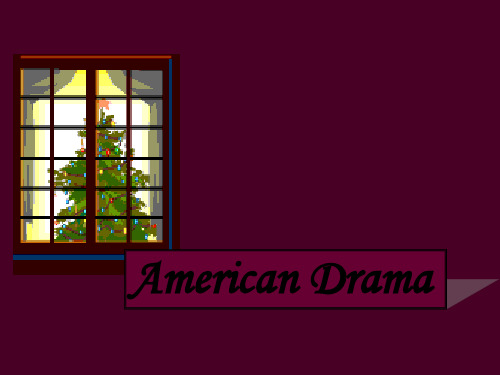
And so it was I entered the broken world
To trace the visionary company of love, its voice An instant in the wind (I know not whither hurled) But not for long to hold each desperate choice. --- “The Broken Tower” by Hart Crane
Clifford Odets
A survey of American drama
1. 2. 3. 4. A gradual process of developing into an literary department equal to poetry and novel 1920s American drama renaissance 1930s American drama of the Great Depression Post-War American drama
American Drama
A survey of American drama
1. 2. A gradual process of developing into an literary department equal to poetry and novel 1920s American drama renaissance
Criticizing the dehumanized effect of modern mechanical civilization “Mother of American drama”, contributing to the development of American drama and American fegram of Character relationship:
Chapter19AmericanDrama

Ⅰ Eugene Gladstone O'Neill (1888−1953) • A. His Life
He was an American playwright, and Nobel laureate in Literature. His plays are among the first to introduce into American drama the techniques of realism, associated with Russian playwright Anton Chekhov, Norwegian playwright Henrik Ibsen, and Swedish playwright August Strindberg. His plays were among the first to include speeches in American vernacular and involve characters on the fringes of society, engaging in depraved behavior, where they struggle to maintain their hopes and aspirations, but ultimately slide into disillusionment and despair. O'Neill wrote only one well-known comedy (Ah, Wilderness!).[Nearly all of his other plays involve some degree of tragedy and personal pessimism.
Part Two Major Playwrights
American Drama美国戏剧课件
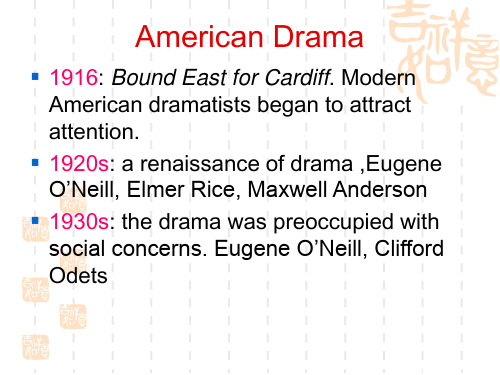
Characterization of Willy
Willy’s personality is projected through other characters in the play. Ben – Willy’s love of nature and the pioneering spirit; Willy’s role model, his alter ego and conscience. Linda – Willy’s love of the city and its settled spirit Biff – Willy’s love for nature Happy-- Willy’s desire to succeed in the city
Characteristics of the play
Stage setting: the Elizabethan kind of stage, the artful manipulation of light, shift of time House frame – transparent of the setting – the psychological drama of Willy in a stream-of-consciousness technique Flashbacks: Ben and the Boston woman
Seascape (1975, Pulitzer Prize)
Three Tall Women (1994, Pulitzer Prize)
The Theater of the Absurd
The Theater of the Absurd came into vogue in the 1950s and 1960s and ceased to be dominant in the 1970s. It refers to some play the theme of which centers on the meaninglessness of life with its pain and suffering that seems funny, even ridiculous. In these works the playwrights try to force the audience to face up to the human condition as it is, instead of presenting a false picture of it and pandering to the public need for reassurance.
American-Drama(共32张)
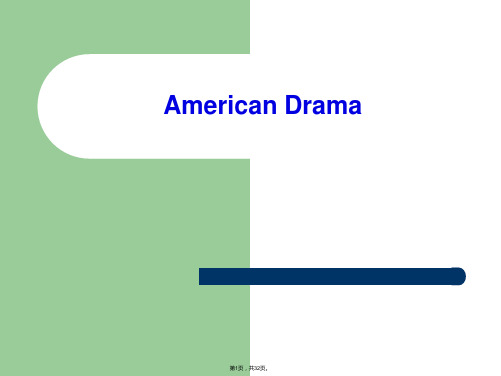
Suddenly Last Summer(夏天的突变)(同性恋)
Sweet Bird of Youth(可爱的青鸟) Period of Adjustment(适应期) Night of the Iguana(鬣蜥之夜) The Milk Train Dose Not Stop Here Anymore(牛奶车不再在此停留(tíngliú)) Red Battery Sign(红色的烟台信号)
Vieux Carre(老广场)
第13页,共32页。
The Glass menagerie
Theatrical form: a “memory play” (the narrator summons moments from his memory)
Characters: the Wingfields (Amanda, Tom, Laura) and Jim O’Connor
the embodiment of reality
第17页,共32页。
Themes
▪ Illusion and reality With the shattering of illusion, people have to come to terms with ruthless reality with courage and confidence
第11页,共32页。
Stylistically: Romantic Southern Gothic Tradition
Female Characterization Women, portrayed often with great sympathy, are at the same time fragile and strong, attractive and repulsive, lonely and vulnerable.
American_Drama
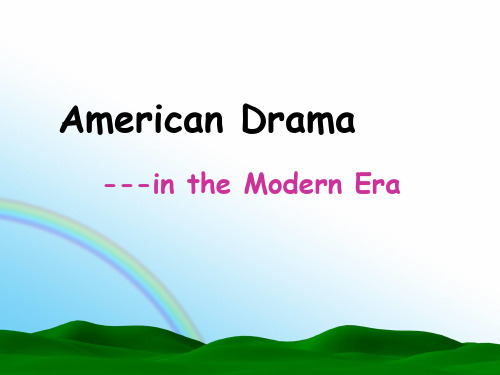
II. Eugene O’Neill (1888-1953)
Introduction Literary Career Characteristics Comment
A. Introduction
Eugene (Gladstone) O'Neill won the Nobel Prize for literature in 1936, and Pulitzer Prizes for four of his plays: Beyond the Horizon (1920); Anna Christie (1922); Strange Interlude (1928); and Long Day's Journey Into Night (1957).
B. Literary Career
O’Neill worked on a variety of one-act plays describing the way an individual willfully connives at his or her own doom. During 1913-1914 he wrote nine one-act plays,then he attended George Pierce Baker’s “47 Workshop”at Harvard University from 1914 to 1915. He wrote six more one-act plays during 1916-1917,and four in 1918. In1920 his first full-length play, Beyond the Horizon, was professionally produced on Broadway. It quickly became popular,and won the Pulitzer Prize, and the name of O’Neill became known throughout the country.
二十世纪的美国戏剧ppt课件

• 后来,美国国会认为联邦剧院的演出是一种共产主义的威 胁,于1939年通过法案把它扼杀了。
为了规范事业单位聘用关系,建立和 完善适 应社会 主义市 场经济 体制的 事业单 位工作 人员聘 用制度 ,保障 用人单 位和职 工的合 法权益
其数量之多甚至无法统计。
为了规范事业单位聘用关系,建立和 完善适 应社会 主义市 场经济 体制的 事业单 位工作 人员聘 用制度 ,保障 用人单 位和职 工的合 法权益
为了规范事业单位聘用关系,建立和 完善适 应社会 主义市 场经济 体制的 事业单 位工作 人员聘 用制度 ,保障 用人单 位和职 工的合 法权益
• 纽约国际弗林吉戏剧节(International Fringe Festival)
• 纽约亚洲表演艺术节(Asia Performing Arts Festival)
• 汉森国际木偶剧节(The Hanson International Festival of Puppet)
• 危险戏剧节(Danger Festival) • 世界上以莎士比亚戏剧为主题的戏剧节堪称最广,
为了规范事业单位聘用关系,建立和 完善适 应社会 主义市 场经济 体制的 事业单 位工作 人员聘 用制度 ,保障 用人单 位和职 工的合 法权益
20世纪美国戏剧
• 第一次世界大战以后,美 国戏剧开始多样化,最杰 出的剧作家是E. 奥尼尔。
• 创作出《琼斯皇帝》、 《安娜 克里斯蒂》、《上 帝的儿女都有翅膀》和 《奇异的插曲》等名剧。
为了规范事业单位聘用关系,建立和 完善适 应社会 主义市 场经济 体制的 事业单 位工作 人员聘 用制度 ,保障 用人单 位和职 工的合 法权益
美国文学-American Drama
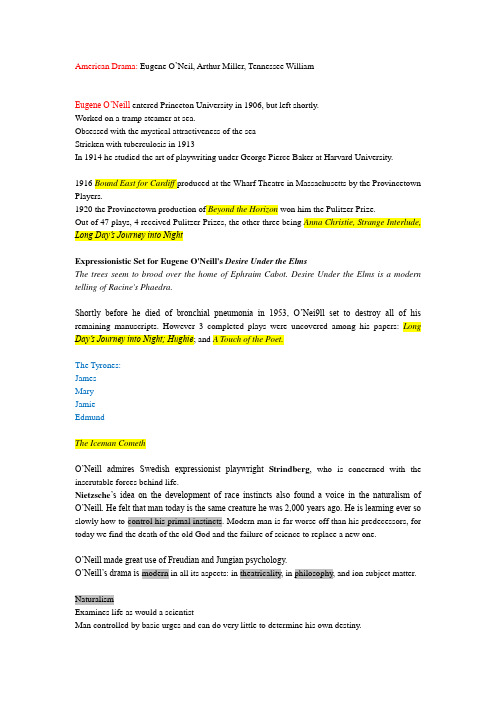
American Drama: Eugene O’Neil, Arthur Miller, Tennessee WilliamEugene O’Neill entered Princeton University in 1906, but left shortly.Worked on a tramp steamer at sea.Obsessed with the mystical attractiveness of the seaStricken with tuberculosis in 1913In 1914 he studied the art of playwriting under George Pierce Baker at Harvard University.1916 Bound East for Cardiff produced at the Wharf Theatre in Massachusetts by the Provincetown Players.1920 the Provincetown production of Beyond the Horizon won him the Pulitzer Prize.Out of 47 plays, 4 received Pulitzer Prizes, the other three being Anna Christie, Strange Interlude, Long Day’s Journey into NightExpressionistic Set for Eugene O'Neill's Desire Under the ElmsThe trees seem to brood over the home of Ephraim Cabot. Desire Under the Elms is a modern telling of Racine's Phaedra.Shortly before he died of bronchial pneumonia in 1953, O’Nei9ll set to destroy all of his remaining manuscripts. However 3 completed plays were uncovered among his papers: Long Day’s Journey into Night; Hughie; and A Touch of the Poet.The Tyrones:JamesMaryJamieEdmundThe Iceman ComethO’Neill admires Swedish expressionist playwright Strindberg, who is concerned with the inscrutable forces behind life.Nietzsche’s idea on the development of race instincts also found a voice in the naturalism of O’Neill. He felt that man today is the same creature he was 2,000 years ago. He is learning ever so slowly how to control his primal instincts. Modern man is far worse off than his predecessors, for today we find the death of the old God and the failure of science to replace a new one.O’Neill made great use of Freudian and Jungian psychology.O’Neill’s drama is modern in all its aspects: in theatricality, in philosophy, and ion subject matter.NaturalismExamines life as would a scientistMan controlled by basic urges and can do very little to determine his own destiny.Forces of environment, heredity, and biological instinct combine to control man’s life.The basic and elemental urges place man in a position similar to that of animals.O’Neill’s characters driven by forces which they cannot understand or conquer.Man’s basic actions in life are governed by these environmental forces.DeterministicMan can do nothing for himself and is constantly at the mercy of forces outside himself. A typical image used by the naturalist is that of person being trapped or being in a cage.In his earlier works, O’Neill often used the physical image of the cage to suggest the position of man caught or trapped in an alien and hostile universe.Naturalism:In naturalism, man is incapable of controlling his destiny and so becomes the victim of greater forces.With a horrified sense of pathos, we watch man struggling against insurmountable obstacles. Consequently, the tragedy lies in man’s awareness and in his consciousness of the futility of struggling against a blind fate.Expressionism:The dramatist suggests symbolically through his staging and his settings certain inner feelings of his characters or his subject matter.More interested in conveying their ideas than in giving a true representation of realityUses symbols and symbolism in portraying crude violence and emotional intensity.Reject the strong individualistic character in favor of the more abstract symbols.There is seldom an interest in cause and effect because the dramatist wants to convey his ideas through abstractions.V ery little sceneryOnly suggest something in the mind of the viewer.In the Hairy Ape the prison would be depicted as a small cage to convey certain thematic significance to the viewer.Y ank is not so much a character as he is a symbolic representation of a type of man who cannot belong in this modern world. He embodies a type rather than an individuality. The people who appear in the Fifth A venue scene are described as manikins, and they walk with a stiff non-human carriage.Peter Stein's 1986 production of Eugene O'Neill's The Hairy ApeThe Hairy Ape (1922) dramatizes man's unsuccessful attempt "to belong" during his yet incomplete evolution from animal to spiritual being. Y ank, a boastful ship's stoker, is called a "filthy beast" by a frightened passenger. Seeking revenge and identity, Y ank insulted some wealthy people on Fifth A venue and is jailed. He attempts to join the I.W.W. (Industrial Workers of the World) but is thrown out as a "brainless ape." Unable "to belong" anywhere, he goes to the zoo and frees a gorilla from its cage in order to befriend it. Instead the beast crushes him to death. Y ank seeks a place in modern society but is rejected even by the apes in the zoo.The primary characteristic of his age--the disintegration of values: moral, spiritual, and religious trying to come to terms with the root of this dissolutionTrying to symbolize the relationship between modern man and his universe,Men’s desires to ―belong‖ are mere playthings in the hands of a capricious deterministic force. Focusing on the social outcast, whose rootless, bitter struggle against a hostile society is symbolic of the position of mankind in an indifferent universe.The Hairy ApeA social drama, but the social problem is only the touchstone to a larger problem, and social dislocation is only a symbol of a more profound cosmic dislocation.Theme:Profound spiritual poverty and disharmony which, beginning as a by-product of the industrial age, soon became its most dominant characteristic.―A w, hell! I can’t see—it’s all dark, get me? It’s all wrong!‖Y ank could not find a spiritual place in the universe.Ontological problem of modern man’s existencePsychological study of one’s sense of beingAttempt to reestablish relationship with natureDrama of the Forties and Fifties:Tennessee WilliamsThomas Lanier "Tennessee" Williams1911-1983Born Thomas Lanier Williams in 1911 in Columbus, Mississippi, lived in St. Louis from 1918 Father an abusive traveling salesman, mother of genteel upbringing, sister emotionally disturbedBorn Thomas Lanier Williams in 1911 in MississippiA near fatal childhood illness, coupled with a protective mother, kept him from the company of other children.His weak physical condition, combined with the influence of his delicate mother, earned him the ridicule of both other children and his highly masculine father, who nickna med Williams, ―Miss Nancy‖.A Master in the MakingWilliams turned to writing as an escape from the cruel world around him.In 1938 after receiving a degree from the University of Iowa, Williams moved to New Orleans, where he had his first homosexual experience. (His first and last affair with a woman had been at Iowa).This was the beginning of a life of sexual promiscuity, which also defines many of his characters (including Blanche).Williams changed his name to Tennessee.By 1940, Williams’s sexual and social identity had been established.Williams—highly successful at this point in his life—floods his work with sex, violence, and personal destruction.His greatest characters are outcasts—usually because their sexual desires put them at odds with conventional society.―Desire‖ is a central word in Williams’s work, but not necessarily meaning lust; it is the struggle to attain, through sex, some psychological and spiritual state that is always unattainable.Blanche will say, ―Death […] the opposite is desire.‖Williams became increasingly dependent on prescription drugs and alcohol, especially after the death of his long time partner, Frank Merlo.Williams died in 1963 in a NYC hotel room after choking on the top of a plastic pill bottle.Main ConcernsThe SouthSexViolenceLonelinessIllusion / BlindnessTime / MemoryGeneration conflictsThe Glass Menagerie (1944)First performed by the Civic Theatre in Chicago, 26 December 1944.New Y ork Drama Critics’ Circle A wardSettingSetting: "Now" (1948) and "the Past" (St. Louis in the 1930s)Allusions to the 1930s, with their"dissolving economy,"Spanish Civil War (Guernica bombed, 1937),labor disturbances.CharactersTom WingfieldAmanda WingfieldLaura WingfieldJim O'ConnorThemesIllusion vs. realityGeneration conflict: Amanda vs. TomLonelinessCriticism of American DreamSymbols andTheatrical MeansGlass menagerieFire escape"Narrator" Tom WingfieldScreen imagesMusic"Plastic theatre"Recurring Themes & SymbolsThemesIllusion vs. RealityMemoryFreedomQuestInstinct vs. Civilized Behavior, struggle between generationsDisintegration of American familyIllusion vs. RealityIn Scene I, Tom says, ―I give you truth in the pleasant disguise of illusion.‖What is the truth at the heart of this story?What is the illusion which disguises it?Illusion vs. Reality — TomWhat are some of Tom’s illusions?Does he have illusions about himself? Others? Life?Illusion vs. Reality — AmandaDoes Amanda have illusions? Is so, what are they?Illusions about herself? Her children? Her life?Is Amanda able to see reality about some things? Which things?Does she see herself realistically? Does she see others realistically?Illusion vs. Reality — LauraDoes Laura have illusions? If so, what are they?Illusions about herself? Others? Life?Does Laura see things realistically?Does she see herself realistically? Does she see others or life realistically?Illusion vs. RealityReferences to ―school of the blind‖ … ―America sits in a dark room‖How do Tom’s asserti ons also serve as a commentary on American life in the lead up to World War II?MemoryWhat is meant by the idea of a ―memory play‖?Does the fact that the play is based on memory make it seem less true or less factual?Do we have to deal with memories in order to move forward?Memory — TomWhich of Tom’s memories are revealed in the play?If the play is based on Tom’s memory, in choosing what to leave in or leave out does he cast himself as ―the good guy‖?How do Tom’s memories affect his behavior?Are there significant details he seems to have left out/forgotten? Why?Memory — AmandaWhat does Amanda remember?When (in what context) does she remember her past?Why does she remember her past?How do Amanda’s memories affect herBehavior?Actions?Decisions?Memory — LauraWhat does Laura remember?When (in what context) does she remember her past?Why does she remember her past?How do Laura’s memories affect herBehavior?Actions?Decisions?Also consider Jim’s memories and how they affect him?MEMORYWhich characters seem most affected by memories? Least affected?Are the affects of the memories positive? Negative?FREEDOMWhat is the definition of freedom?Financial freedomEmotional freedomThe ability to make decisions for oneself? To have a variety of choices?FreedomWhich characters are most free? (financially and emotionally)Least free?What would freedom mean to each character?Do all the characters seek freedom? Why or why not?What is the price of freedom? Is it selfish?Instinct vs. Superior ThingsWhat is meant by instinct?What is meant by superior things?Which characters believe in instinct? Which characters believe in superior things?How do these beliefs create conflict between these characters?What is the result?InstinctWhat is instinc t? (according to Webster’s)―an inborn pattern of activity or tendency to action common to a given biological species‖―a natural inclination or attitude‖―natural intuitive power‖Instinct — TomLate for dinnerChews food quicklyUses vulgarity, profanityReads DH LawrenceArgues with mother, othersSmokesGoes to moviesDrinksGulps coffeeIs selfish??Wants to ―face facts‖Instinct vs. Superior ThingsWhat are superior things?MannersEtiquette and social gracesTalking of refined (not coarse, not vulgar) thingsHaving civilized ambitions, wants, hopes, dreamsSuperior Things — AmandaGrace at dinnerTable manners―never anything coarse, or common, or vulgar‖―fresh and pretty‖Wants both children to take classes―defect …. Slight disadvantage … develop charm‖Makes small talk when doing salesLawrence –―horrible book‖Superior Things — AmandaDoesn’t want Tom to jeopardize job with ―shameful‖ behaviorBelieves that hard work = success―sacrifices‖―nothing offends people worse‖Says girls shouldn’t fall for appearance (listen to instincts)Home improvementsDances, picnics, flowersLaura and JimLaura and instinctLeaves class when nervousWon’t answer door when scaredQuits school when embarrassedJim and superior thingsPosition at warehouseSelf-esteem, taking classesCan put on ―an act‖ConflictTom and AmandaTom: ―Man is by instinct a lover, a hunter, a fighter and none of those ….‖Amanda: ―Surely your aims are somewhat higher than theirs! Than monkeys — pigs —‖Which wins?When angry (giving in to instinct), Tom shakes the glass menagerieWhen giving in to instinct, Amanda marries the ―wrong man‖ and Laura’s unicorn gets broken Tom leaves the family, follows instincts for survival, selfish pleasure; however, he doesn’t seem happy in end.The American DreamDefinition: Hard work = successWhat is success: money, a home, a family?What traits are needed to achieve this?TalentAmbitionOptimism/believe/faith in the systemStrong work ethicIntelligenceSocial skillsThe American Dream for playWhich characters possess the traits needed to achieve the American Dream?Is it likely any of them will achieve the American dream? Why or why not?SYMBOLSSymbolsGlass and glass menagerieParadise HallBlindnessBlue, Blue RosesBurning, fire, candlesAlleywayZoo, hot houseMagic show, coffinA Streetcar Named Desire (1947)First produced in New Y ork at the Barrymore Theatre, 3 December 1947Pulitzer PrizeNew Y ork Drama Critics' Circle A wardSettingAlternative title: Loneliness, the Last Step (Austria, 1947)1920-1948: Streetcar line called "Desire" in New Orleans serving the bar and nightclub section of the French QuarterCharacters and PlotBlanche DuboisStanley KowalskiStella KowalskiHarold Mitchell (Mitch)ConflictsOld South vs. New SouthMemory vs. present timeSexuality vs. moralityAppearance vs. realitySymbols, Metaphors, and Theatrical MeansAnimal imageryMeatLight bulbMusicA Study of Blanche DuBoisImportant Characters in StreetcarBlanche DuBoisStella- Blanche’s younger sisterStanley- Stella husband, a Polish immigrantMitch- friend of Stanley’s and love interest of BlancheBlanche comes to visitPlay begins with Blanche coming to visit Stella (though the audience is unsure why).Although Blanche feels Stella has married ―beneath‖ her (they were raised in a wealthy family) and constantly criticizes Stanley, Blanche longs for the love and intimacy that define Stella and Stanley’s relationship.Taking the ―Streetcars‖Blanche’s first words of the play are symbolic of her journey in life: ―They told me to take a streetcar named Desire, and then transfer to one called Cemeteries and ride six block and then get of at—Elysian Fields.‖The first part, ―take a streetcar named Desire, and then transfer to one called Cemeteries‖ refers to the events in her life prior to the play.The second part, ―Ride six blocks and then get off at—Elysian Fields‖ deals with the play itself.A Life of DesireThe audience learns that prior to the play, Blanche was married to Allan Grey.―When I was 16, I made the discovery—love…It was like you suddenly turned a blinding light on something that had always been half in the shadow.‖This loving desire is the same that Stella and Stanley have for each other.However, her discovery of her young husband’s homosexuality [― I saw! I know! Y ou disgustme…‖] causes his suicide, turning Blanche’s loving desire into hate and self-loathing. Transferring to ―Cemeteries‖This disgust and self-hate result in her destructive lust for young men.The audience learns that she been fired from her former teaching position because of relations with a 17 year-old student.This lust ultimately leads to her downfall; Blanche has transferred to the streetcar named ―Cemeteries‖.At this point in Blanche’s life, the play begins.Death (symb olized by the streetcar ―Cemeteries‖) can bring either heaven or hell.Blanche can either ―ride six blocks and then get off at—Elysian Fields‖, or she can continue, broken spirited, to her final ―death‖—a life without desire.Blanche’s Possible Salvation(Elysian Fields)Blanche confesses to Mitch, with complete honesty, the story of how she destroyed her young husband. (Her honesty is significant because prior to this point, her relationship with Mitch is based solely on lies.)In response to Blanche’s outpouring of emotion, Mitch says, ―Y ou need somebody. And I need somebody, too. Could it be—you and me, Blanche?‖Through her sobs, Blanche replies, ―Sometimes—there’s God—so quickly!‖This concluded the sixth scene (the sixth block on Blanche’s ride to de ath), and Blanche is on the threshold of finding ―Elysian Fields‖, ―God‖, and her salvation.However, Mitch soon learns of Blanche’s promiscuity after Allan’s death (about which she has lied to him), and he confronts her. She finally admits: ―Yes, I had ma ny intimacies with strangers. After the death of Allan—intimacies with strangers was all I seemed able to fill my empty heart with…‖Flowers for the DeadOutside the house a Mexican woman is heard faintly, ―Flores. Flores. Flores par los muertos…‖Blanche hears the woman, goes to the door, opens it, and stares at the woman.When the woman asks Blanche ―Flores para los muertos?‖ Blanche seems to understand the signficance; she slams the door, screaming, ―No, no! Not now! Not now!‖The Opposite of DesireIt i s now that Blanche states, ―Death […] the opposite is desire.‖Blanche has missed her opportunity for love and intimacy with Mitch—all that is left for her is death.Blanche’s final, tragic collapse comes in the second to last scene when Stanley rapes Blan che. Her spirit breaks, and she “sinks to her knees. He picks up her inert figure and carries her to the bed.” She accepts her fate.Blanche becomes semi-delusional; she starts to believe that an old flame is coming to get her. The play ends as Blanche is lead away by a Doctor (sent for by Stella and Stanley) who takes her to a mental institution (implied).Death of a Salesmanby Arthur MillerAmerican Dream Gone AwryAbout the Playwright:Arthur MillerBorn in New Y ork City to a middle-class Jewish Family on October 17, 1915 and died Feb. 11, 2005.His father, a manufacturer of women's coats, was hard hit by the Depression and could not afford to send Miller to college when the time came.Miller worked as a loader and shipping clerk at a New Y ork warehouse to earn tuition money.Began as playwright at University of Michigan, and met his first wife.All My Sons (1947) his first Broadway success—winner of the New Y ork Drama Critic’s Circle A wardPulitzer Prize winner for Death of A Salesman (1949)Double winner of New Y ork Drama Critics Circle A ward50 years later, Deathwas awarded anotherTony award for bestrevival of BroadwaySeason.Miller, then 83, receiveda lifetime achievementaward.In the early 50s, Miller became associated with a number of left-wing causes and (like many other prominent writers) became a target for Senator Joseph McCarthy’s Communist-hunting committee.The Crucible (1953) is based on Salem witch trial.A View from the Bridge (1955)A View from the BridgeArthur Miller's marriage to Marilyn Monroe (Hollywood’s sex symbol) in 1956 furt her catapulted the playwright to fame, though that was publicity he said he never pursued.The marriage lasted 4 years. In 1962 he married Ingeborg Morath, a Swiss photographer.After the Fall (1964) was autobiographical.In Paris, September 12, 2001PlotAct IWilly Loman, over 60, returns unexpected to his Brooklyn home, hauling in his big sample suitcases.He has kept losing control of his car.His wife urged him to talk to his boss for an easier job in town.Their grown sons, Biff and Happy, are again home, sharing their old room upstairs.Biff, 34, has quit one more farm job out West. How can such an impressive lad be so lost?Willy regrets that their house, at last almost paid for, has been gradually hemmed in by soaring apartments. He misses the earlier country scents of spring flowers.Upstairs, the boys recall their first flings with prostitutes.Biff likes heading cattle better, but fears that it offers no future.Happy, younger and cockier, can afford an apartment, a car, and the sensual affairs he craves. But he envies the highly paid merchandise manager, and gets even by taking bribes and seducing the fiancees of fellow employees. Biff invites him to join him in some outdoor ranch project.Biff talks of floating a loan from a sporting-goods man. Long ago, he stole a carton of basketballs from him.Willy recalls a scene with young Biff and Happy shining up the family car. The children idolized him. Y oung Bernard, the studious boy next door, warns that Bill is failing math and may not graduate. Bill however predicts greater success for his sons since they are better liked than Bernard.Will is disturbed by new reports of Biff’s wildness. Back in the present, Charley, Bernard’s father, comes over to soothe Willy with a card game. Willy remains nervous and irritable.Something Charley says makes him recall his older brother Ben. Ben once told him of having made a fortune quickly in Africa diamonds. Ben also recounted how their father crossed the country with them in a wagon selling flutes. The flute music is heard through much of the play.Ben urges Willy to try his fortune in Alaska and gives young Biff a lesson in fighting ruthlessly, jungle style. Charley warns that Bill is taking lumber from building projects, but Willy sees this as initiative. He sneers at Charley and Bernard as unable even to hammer nails.Present. Linda rebukes Biff for quarrelling with Willy. She loves her husband deeply, and believes he deserves respect. Willy is on straight commission. He tries suicide. He drove his car off the road. He keeps some tubing handy, for inhaling gas. Will, however, is delighted to hear Biff’s project. Happy says he will get married. The moon shines brightly on the little house.Act IIThe next morning, Willy is told that they need some two hundred dollars to cover the insurance premium, repairs, and the last home mortgage payment. The house will be theirs. The boys have promised to take him to dinner that night.Willy talks to Howard, son of Willy’s former boss. Howard ev entually discharges Willy.Ben recalls Ben’s urging to seek his fortune in Alaska. He relives the day of Biff’s last football triumph.Present. Will enters Charley’s office. Bernard is a lawyer now, off to try a case before the SupremeCourt. Willy asked Hernard why Biff gave up. He is told that Biff lost heart not after the math failure but after a trip to Boston to meet Willy.He receives a large sum of money from Charley, who disputes the idea that success stems from being well liked. He also sharply denies that Willy would be worth more dead.At Franks’ Chop House, Happy picks up an attractive prostitute. He sends her for a friend for his brother.Biff come to the restaurant to tell the father that he fails to borrow any money. He stole a fountain pen as a revenge. His whole life has been one great lie. Willy idolized his son, Biff, who caught him in a hotel room with the lady buyer. Biff denounced his father as a lying fake and dropped plans for going on to any university.Present. Willy returns from the men’s room. He finds his sons and prostitutes gone. The sons later return home with flowers to Linda. Mother is furious and orders both to leave home and stop tormenting their father. Willy talks with the phantom of Ben the merits of killing himself, and leaving the twenty thousand dollars of insurance for Bill. It would be a great gesture. He would have a huge funeral of a well-liked salesman.Biff and Willy quarrel bitterly. Biff confesses that he has just been in jail for stealing a suit. They quarrel further, but Biff breaks down.Will, convinced at last of his son’s love, knows what he must do. Over Linda’s fearful protests, he drives off in his car to kill himself.RequiemCharley, Bernard, and the three Lomans are the only mourners at W illy’s grave.They talk of Willy’s fine carpentering, and Charley envisions him as riding on ―a smile and a shoeshine.‖ Biff is leaving, but Happy still wants to make Will’s grandiose ideas work. Linda alone sobbingly asks Willy why he did it. They had their house and could now at last have been really free.Central ThemesAddresses family conflict in post-World War II AmericaTakes a close look at the price paid for the ―American Dream‖Charges America with creating a capitalist materialism centered around a postwar economyThis materialism skewed the original view of the ―American Dream‖ as envisioned by the founding fathers.A man destroyed by his own stubborn belief in the glory of American capitalism and the redemptive power of success.Major CharactersWilly LomanFather, traveling salesmanBelieves in chasing the American Dream although he never achieves itPins his failed hopes on his sons, Biff and HappyBecomes mentally ill when pressure of reality crushes his illusionsBiff LomanElder son, 34 years oldHigh school standout-football star, many male friends, and female admirersAcademic failures lead to a life of kleptomaniaRepresents Willy’s vulnerable, tragic sideFails to reconcile his father’s expectationsLinda LomanLoving, devoted wifeNaïve and realistic of Willy’s hopesEmotionally supportive of WillyWilly’s strength until his tragic perishingHappy LomanY ounger son, 32 years oldIn Biff’s shadow all his lifeRelentless sex and professional driveRepresents Willy’s sense of self importance and ambitionOften engages in bad business ethicsCharleyThe Lomans’ next door neighborSuccessful businessmanOften gives Willy financial supportDescribed sadly as Willy’s only friend although Willy is jealous of Charley’s success BernardCharley’s sonSuccessful lawyerOften mocked by Willy for being studiousCompared to Loman sons by Willy; they do not measure up to his successBenWilly’s deceased older brotherIndependently wealthyAppears to Willy in daydreamsWilly’s symbol of success that he desperately wants for his sonsThe WomanWilly’s mistressHer admiration for Willy is an ego boostBiff catches Willy with her in a hotel roomBiff loses faith in his father due to infidelityHoward WagnerStanleyJennyMiss Forsythe and LettaTechniquesFlashback scenes, representing past experiences now preying upon Willy’s distracted mind Set designed for unhampered movement。
American Drama 美国文学
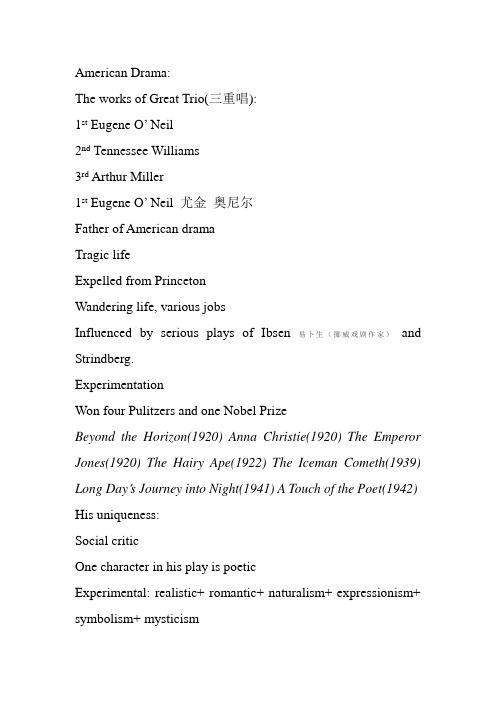
American Drama:The works of Great Trio(三重唱):1st Eugene O’ Neil2nd Tennessee Williams3rd Arthur Miller1st Eugene O’ Neil 尤金奥尼尔Father of American dramaTragic lifeExpelled from PrincetonWandering life, various jobsInfluenced by serious plays of Ibsen易卜生(挪威戏剧作家)and Strindberg.ExperimentationW on four Pulitzers and one Nobel PrizeBeyond the Horizon(1920) Anna Christie(1920) The Emperor Jones(1920) The Hairy Ape(1922) The Iceman Cometh(1939) Long Day’s Journey into Night(1941) A Touch of the Poet(1942) His uniqueness:Social criticOne character in his play is poeticExperimental: realistic+ romantic+ naturalism+ expressionism+ symbolism+ mysticismPessimisic view of worldTragedy (human’s isolation and helplessness)The Hairy Ape 毛猿-botom cabin of steam shipWhile stoker Yank feeding the furnace(火炉)Daughter of iron tycoon curiously visited the botom worker and creamed ” filthy beast” for she was shocked by Yank’s savagery -Yank’s dignity was destructed, so he went to the 5th Street to release his hatred-Yank found belonging with Ape in the cage of the zoo but was hugged to death by apeLong Day’ s Journey into NightAutobiography18 hours of a family in a foggy dayFather: Mr Tyron(retired actor, unfulfilled dream, miser(吝啬鬼))Mother: Ms Tyron(delicate gentlewoman, from a well-to-do family, convent女修道院years, addicted to morphine吗啡) Brothers: Jamie and EdmundJamie: cynical to society, degraded to alcohol and prostitution, Odedipus Complex, envy EdmundEdmund(model from O’Neil) poetic and talented, but ailed byT.B.Dilemma: in the 18 hours, they loved each other, but they accused each otherSymbols :Day: hope Night: loss of hope for future, despairFog: shaky illusion, worriesSea: freedom, relief, escape from realityGlasses:self-consciousnessTheme :Ailment of societyEmptiness of human soul, wasteDespair, agony(感情上的爆发) of modern peopleFalsehood of American DreamAmerican’ s best tragedy “in blood and tears”Tennessee Williams(1911-1983)1st his life:Poor childhood, drop school, work in shoe factoryFrustration at the start of careerBig hit from The Glass MenagerieW on two PulitzersHomo-sexualUniqueness of his works:Lonely and fragile lady, southern beauty, lost in past memory, outsiderGentleman callerReality escaperGrotesque: murder, prostitute, homosexual, alcoholic, addicts…. His works:The Glass Menagerie(1944) A Streetcar Named Desire(1947) Summer and Smoke(1948) The Rose Tattoo(1951)Cat on A Hot Tin Roof(1955) The Night of the Lguana(1961) The Glass MenagerieAutobiographic:Amanda: former southern belle deserted by her husband tries to maintain familyLaura: crippled 残废的and introvert 内向的人, retreats to her individual world by her collection of glass animalsTom: som, working in shoe warehouse, escapes from reality by poems and movieAmanda urges Tom to bring his co-worker Jim(gentleman-caller) home for LauraThey are left alone and talkJim was Laura’ s school idolThey dance but Jim was already engagedJim breaks the horn角of unicorn独角兽,麒麟Tom leaves homeAmanda and Laura rise from their illusionThey all escape the realityAmanda: her girlhoodLaura: her glass menagerieTom: movie and poemsA Streetcar Named DesireBlanche Dubois: delicate southern belle struggles from her decayed filthy肮脏的pastStanley Kowalski: Stella’ s husband, man full of animal vitality, materialistic唯物主义的, brutal残忍的and firmly defends防守his groundStella: Blanche’ s sisterMitch: Stanley’ s poker pal同志Blanche comes to Stella’ s homeHer values clash with与冲突,不调和StanleyH er love affair with Mitch is ruined by Stanley’ s investigation Stella gives birth to a babyBlanch is raped by Stanley and goes to madnessClash of valuesBlanche: feminine, fallen south, delicacy, poetic, illusionaryStanley: masculine, rising industrial, rough, practical, dominant Arthur Miller(1915-)1st his lifeJewsHis father went bankruptcyRelated with common’s fatePulitzer PrizeTheory of theatre(play saves one from his solitary, focus on human relations)Involved in McCarthyism2nd His playsAll My Sons(1947)Death of a SalesmanThe Crucible(1953)A View from the Bridge(1955)After the Fall(1964)Death of a SalesmanBilly: a traveling salesman in his 60s, often falls in trance on his drivingLinda: his wife, adores and trust himBiff: Billy’s big son, returns from his wandering life. He once being sport star, failed an exam and turned to Billy, but foundhim with a strange woman in a hotel, so he degrades from then on.Happy: his little sonStory :Willy was fired and borrowed money to pay insuranceBiff determined to turn a new leaf, failed to get loan from boss but stole a pen from himWilly knew Biff’s bad news and his mind began to wander in his momory, having imagined talk with his dead brother Ben who succeeds. He then commits suicide, the insurance money will give Biff a good start.Old Good DaysRespects compassion gratitude and dignityNow:(capitalist jungle) indifference selfishness and profits Ameircan Dream:Willy believes that a man can get success by his good looking, charming personality and hard workDisillusioned dreamBiff knows after Willy’ s death: man has to face the reality, can’t live in lies and illusionsSocial protestNew techniqueStream of consciousness(memory)Multi-functional stage(no wall, settings)Lighting(move of light-psychology)Music(nostalgic+intense)Realism+expressionismSummary about American theatre:Social protest: indifferent, cruel and dehumanized capitalistic societyHuman existence: waste, emptiness, isolation, dilemma Experimentation:realism+naturalism+expressionism+symbolism+myticism+strea m of consciousnessEnrich theatre by adding into other art froms: music, dance, panting, sculptureStage decoration: fragmented space, point of view, lighting。
美国文学Chapter+19+American+drama

Elmer Rice——Playwright and novelist
His works: The Adding Machine (加算器) On Trial (审判) Street Scene (街景) Left Bank (左岸) Judgment Day (审判日) Dream Girl (梦幻女孩) The Grand Tour (豪华的旅行) The Winner (胜者)
3
Eugene O’Neill
Life experiences: 1、His father, James O’Neill was a famous actor 2、In the winter of 1912-13 when he developed tuberculosis and was sent to a sanitarium, he had the leisure to read and meditate. 3、He joined, some time in 1914, the famous Professor Pierce Baker’s 47 Workshop at Harvard to learn to write better. 4、He received the Nobel Prize in 1936.
6
Eugene O’Neill
Best works: The Hairy Ape (毛猿) concerns the problem of modern man’s sense of “belonging”. The Iceman Cometh (送冰人来了) is the best work and represents the fact the O’Neill lifelong quest for values ended in failure. Long Day’s Journey into Night (进入黑夜的漫漫旅程) is somewhat autobiographical. All the four characters suffer frustrations and wish to escape from the harsh reality. It is a metaphor for O’Neill lifelong endeavor to find truth and the way to acceptance.
美国戏剧
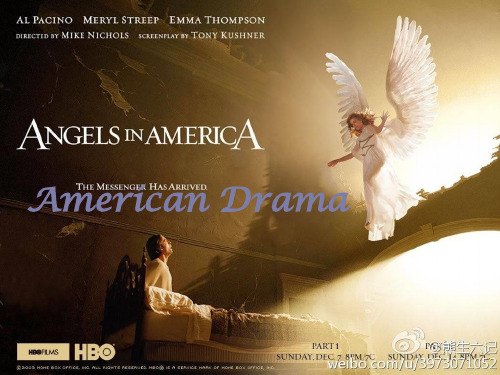
1940s
Tennessee Williams
Arthur Miller
Edward Albee
1960s
David Mamet Sam Shepard
Sam Shepard
David Mamet
Buried Child
Eugene O'Neill (1888-1953)
尤金· 奥尼尔是美国民族戏 剧的奠基人。评论界曾指出: “在奥尼尔之前,美国只有剧场; 在奥尼尔之后,美国才有戏剧。” 一生共4次获普利策奖(1920, 1922,1928,1957),并于1936 年获诺贝尔文学奖。
《毛猿》(1922)是一部兼有现实主义、表现主义和象征 主义的戏剧。主人公扬克是一艘远洋轮船上的司炉,以身 强力壮得到同伴的敬畏而自豪,但遭到旅客中一个有钱的 女人的侮辱,便到去寻找他的生活地位,最后只好与动物 园的一只大猩猩结交朋友,结果却死在它的大力拥抱之中。 剧本表明在冷酷无情的资本主义社会,象扬克这样的工人 只能忍受非人的待遇。要想改变这种状况,只会遭到更加 悲惨的结局。
O'Neill's career as a playwright
1912-1920 Begin writing in a naturalistic vein
1920-1934 Become somewhat obsessed with devices such as symbolism and expressionism
1. 1940年时,米勒与在大学中结识的女友玛莉· 史拉托利 (Mary Slattery)结婚。婚后育有珍妮(Jane)与罗 伯特(Robert)二子,而因为他曾经在美式足球赛中受 过伤,有幸可以在第二次世界大战期间免除兵役。1956 年时,与妻子仳离。 同年6月,美国众院非美行为调查委员会调查演艺圈有 无共产党颠覆活动,被伊利亚· 卡赞指称参与了共党集会, 米勒1953年创作的《炼狱》因反对美国的极右翼麦卡锡 主义被誉为“美国戏剧的良心”,1957年3月31日,米 勒因为拒绝提供参与共党集会者的姓名,被控藐视国会, 之后在1958年8月8日由美国最高法院给予平反。同年, 发表《戏剧集》(Collected Plays)。
美国文学史及选读AmericanDrama

Chapter 19 American Drama
Revision
Questions to Answer!!!
Who are the three women writers we talked about in the last lecture?
Name some of their famous works.
Major themes in his play
Men's struggles with his own fate Loss of self Alienation
The Hairy Ape
O'Neill explained The Hairy Ape by
saying that it was a symbol of man, who has lost his old harmony with nature, the harmony which he used to have as an animal and has not yet acquired in a spiritual way. Thus, not being able to find it on earth nor in heaven, he's in the middle, trying to make peace.
diversity became one of its salient
features.
Eugene O'Neill (1888-1953)
Tennessee Williams (1911-1983)
Representatives
Arthur Miller (1915-2005)
AmericanDrama
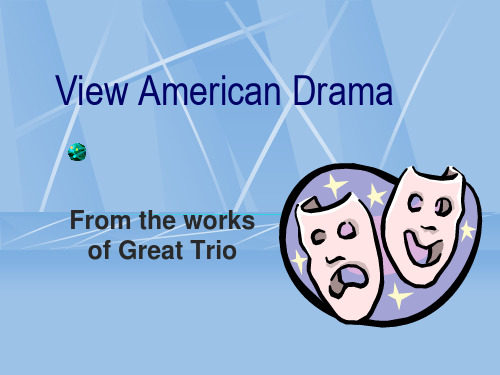
From the works of Great Trio
About drama
Dual nature: Be read like poetry and fiction Be performed on the stage Ideas told through characters Concrete and tangible characters visualization
Elements of Drama
plot character dialogue theme staging(Fra bibliotekpectacle)
Types of drama
Tragedy (catharsis) Comedy Tragicomedy Historical Farce Miracle …
Good drama
bottom worker and creamed “ filthy beast” for she was shocked by Yank’s savagery Yank’s dignity was destructed, so he went to the 5th Street to release his hatred Yank found belonging with Ape in the cage of the zoo but was hugged to death by ape.
comment
Theme:
environment fate inner power
Father’s hatred of sea Anne’s fall
The Hairy Ape 《毛猿》
Bottom cabin of steam ship While stoker Yank feeding the furnace Daughter of iron tycoon curiously visited the
美国文学史之Modern American Drama(1)
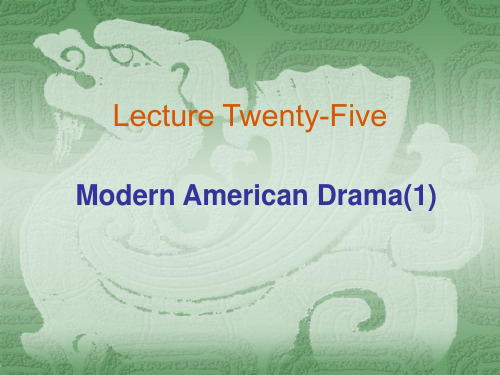
Adding Machine
Protagonist: Mr. Zero
Theme: a vehement protest against the
dehumanizing effect of the machine age Style: technique of expressionist flashbacks.
Introduction about modern American Play
Bound East for Cardiff (1916) A Renaissance of Drama in the 1920s:
Elmer Rice’s The Adding Machine;
O’Neill’s Beyond the Horizon; Maxwell Anderson’s What Price Glory; George Kelley’s The Show-Off; Sidney Howard’s They Knew What They
(1914-1915) Bound East for Cardiff (1916) Nobel Prize (1936) Boston (1953)
Major Plays
three periods:
1916-1920: Bound East For Cardiff; Beyond the Horizon (1920) 1920s-1934: The Emperor Jones(1920); Anna Christie(1921); The Hairy Ape (1922); All God’s Chillun Got Wings(1924); The Great God Brown (1926); Mourning Becomes Electra (1931); (a trilogy about the fate of women) Ah, Wilderness! ( 1933) (the only comedy)
American-drama
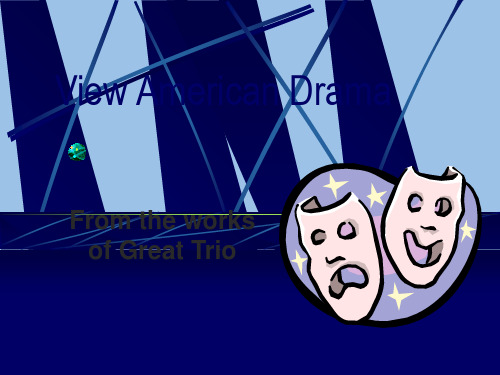
Beyond the Horizon
《天边外》
A seashore village Two brothers Robert: poetic and dreams to leave for a sea voyage Andrew: practical and desires to marry his sweetheart Lucy
Dilemma: In the 18 hours, they loved each other, but they accused each other
symbols
Day: hope Night: loss of hope for future, despair Fog: shaky illusion, worries Sea: freedom, relief, escape from reality Glasses: self-consciousness
bottom worker and creamed “ filthy beast” for she was shocked by Yank’s savagery Yank’s dignity was destructed, so he went to the 5th Street to release his hatred Yank found belonging with Ape in the cage of the zoo but was hugged to death by ape.
Uniqueness of his works
Lonely and fragile lady, southern belle, lost in past memory, outsider, Gentleman caller Reality escaper Grotesque: murderer, prostitute, homosexual, alcoholic addicts…
- 1、下载文档前请自行甄别文档内容的完整性,平台不提供额外的编辑、内容补充、找答案等附加服务。
- 2、"仅部分预览"的文档,不可在线预览部分如存在完整性等问题,可反馈申请退款(可完整预览的文档不适用该条件!)。
- 3、如文档侵犯您的权益,请联系客服反馈,我们会尽快为您处理(人工客服工作时间:9:00-18:30)。
The absurdity of life
Albee has been linked with the traditions of the Theater of the Absurd. His plays seem to have dwelled on one problem only, i.e., the absurdity of human life built very much on a frail illusion and spiritual emptiness. Who’s Afraid of Virginia Woolf? George and Martha, a son, 21th birthday, Nick and Honey
Long Day’s Journey into Night
Elmer Rice (1892-1967)
The Adding Machine (1923) Off-stage devices: sound and light
Susan Glaspell (1882-1948)
Mother of American Drama Founded the Provincetown Players One-act play: Trifles《鸡毛蒜皮》
Desire Under the Elms (1924)
Ephraim Cabot, tall, gaunt, 75 Eben Cabot, a son from Ephraim’s second marriage, tall, good-looking, sinewy, and 25 years old Abbie Putnam, Ephraims’s new wife, buxom, full of vitality, and 35 years old
ቤተ መጻሕፍቲ ባይዱ
1940s: Tennessee William dominated the theater. The Glass Menagerie The early fifties: Arthur Miller, William Inge, Death of a Salesman The late fifties: a temporary decline 1960s: American drama picked up fresh energy. The Theater of the Absurd. Heavily political. A tendency to “decentralize” from Broadway. Edward Albee, David Mamet
Eugene O’Neill (1888-1953)
Born in a goddam hotel room and dying in a hotel room! Nobel Prize in 1936, Beyond the Horizon Father, James O’Neill a famous actor Voyage to South America and South Africa Tuberculosis, sanitarium Greenwich Village, New York
The Glass Menagerie
The Wingfields: Mother Amanda,Tom, Laura Jim O’Connor Escape, prison
A Streetcar Named Desire
Blanche Dubois New Orleans Stella and Stanley Kowalski Mitch
Major Plays
Bound East for Cardiff (1916) Beyond the Horizon (1920) first Pulitzer Anna Christie (1921) second Pulitzer The Hairy Ape (1922) Strange Interlude (1928) third Pulitzer Marco Million (1928) Long Day’s Journey into Night (1956) fourth Pulitzer
William Inge (1913-1973)
Bus Stop: Cherie
Edward Albee (1928-)
The Zoo Story (1958)
Who’s Afraid of Virginia Woolf? (1961-62,
Tony Award)
A Delicate Balance (1966, Pulitzer Prize)
Arthur Miller (1915-2005)
All My Sons (1947) Death of A Salesman (1947) the Tony Award and the Pulitzer Prize The Crucible (1953) After the Fall (1964) The Price (1968) A typical theme: the dilemma of modern man in relation to his family and work
Characteristics of the play
Stage setting: the Elizabethan kind of stage, the artful manipulation of light, shift of time House frame – transparent of the setting – the psychological drama of Willy in a stream-of-consciousness technique Flashbacks: Ben and the Boston woman
Clifford Odets (1906-1963)
Waiting for Lefty (1935)
Tennessee Williams (1911-1983)
The Glass Menagerie (1945) A Streetcar Named Desire (1947) Pulitzer Cat on a Hot Tin Roof (1955) Pulitzer Night of the Iguana (1961) The Milk Train Does Not Stop Here Anymore (1963)
Why “Virginia Woolf”?
Martha is well read and has a kind of respect for language. She would have identified herself Virginia Woolf who had an incredible amount of verbal wit and could have committed suicide all the same. “Virginia Woolf” is used as a homophone for “wolf,” repeating a line from a ballad, “who is afraid of the big, bad wolf?” The wolf is a metaphor for the hopelessness that stretches before them.
American Drama
1916: Bound East for Cardiff. Modern American dramatists began to attract attention. 1920s: a renaissance of drama ,Eugene O’Neill, Elmer Rice, Maxwell Anderson 1930s: the drama was preoccupied with social concerns. Eugene O’Neill, Clifford Odets
Seascape (1975, Pulitzer Prize)
Three Tall Women (1994, Pulitzer Prize)
The Theater of the Absurd
The Theater of the Absurd came into vogue in the 1950s and 1960s and ceased to be dominant in the 1970s. It refers to some play the theme of which centers on the meaninglessness of life with its pain and suffering that seems funny, even ridiculous. In these works the playwrights try to force the audience to face up to the human condition as it is, instead of presenting a false picture of it and pandering to the public need for reassurance.
Characterization of Willy
Willy’s personality is projected through other characters in the play. Ben – Willy’s love of nature and the pioneering spirit; Willy’s role model, his alter ego and conscience. Linda – Willy’s love of the city and its settled spirit Biff – Willy’s love for nature Happy-- Willy’s desire to succeed in the city
